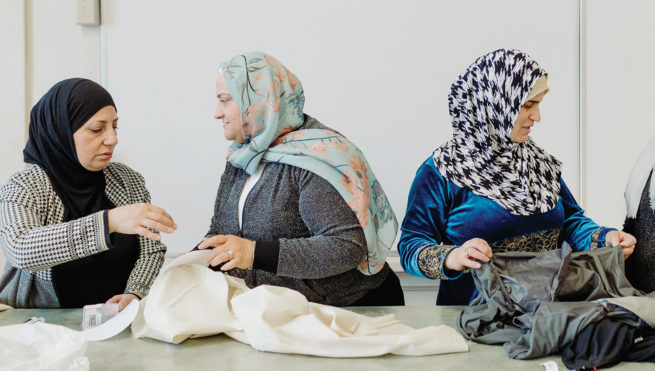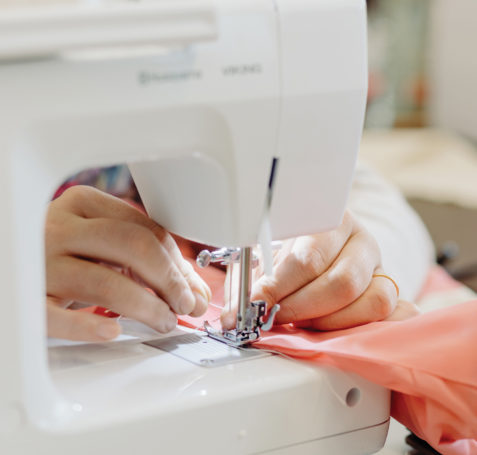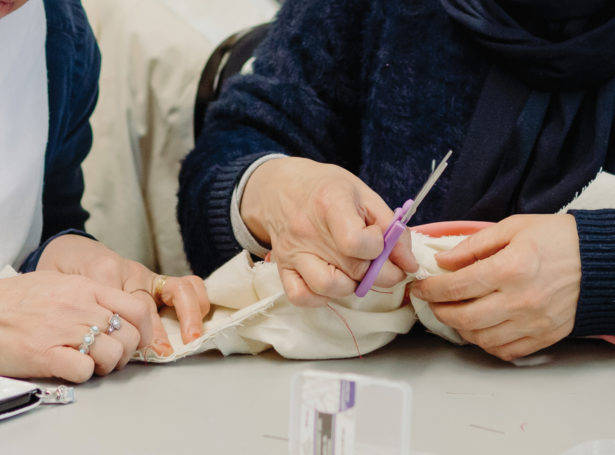March 1, 2020
Global Stitches empowers refugee women with advanced sewing skills and business acumen
As a young girl growing up in Syria, Hodan Abdullah loved to sew clothes for her Barbie dolls. She began with big, beautiful princess dresses and moved on to making blouses and jackets — outfits she could imagine herself wearing.
But this wasn’t just childhood play; Abdullah was teaching herself the sewing skills she’d need to become a fashion designer. The dream followed her into adulthood and she began making plans to get the education she needed to make it happen.
“In Syria, they didn’t have a college for fashion design, so my plan was to go to Lebanon, because there are lots of opportunities there when it comes to fashion,” she says. “That was the plan before the war started.”

A snag in the plan
Abdullah’s dream was put on hold when she and her family found themselves in the midst of civil war for the second time since she was born. The family fled violence in Somalia when she was a toddler and settled in Syria because of its highquality, public education and the work opportunities available to her father, a veterinarian.
This time, the family fled to Canada as Abdullah’s mother had a friend in Edmonton. They arrived in 2015 and, once again, began building a new life in a very different place.
At first, Abdullah focused on improving her English and found a retail job at Sears. Then, she completed a program to become a healthcare aide. Although she liked the work and the income, “it wasn’t my dream,” she says.
Last year, she learned about a program that could help her finally make her dream a reality and eagerly signed up for one of the 20 spots available.

Mending dropped threads
Launched in the summer of 2018, Global Stitches has been teaching refugee women in Edmonton how to sew and embroider clothing and other textiles — skills they can use to earn income for their families. The program also offers entrepreneurial training to give participants the knowledge they need to launch a sewing business and provides each graduate with a sewing machine and other tools to get started.
The program is an initiative of the Islamic Family and Social Services Association (IFSSA), which offers spiritually and culturally appropriate social services to Edmonton’s Muslim communities — but supports all refugee families regardless of their countries of origin. Rola Mustafa, an IFSSA refugee support manager of Global Stitches, explains that the program was created after a number of clients expressed an interest in developing sewing skills to earn income.
“In many of the refugee camps — like those in Turkey, Jordan and Lebanon — it’s common practice to teach women to sew, so they can learn new skills and generate income,” says Mustafa. It made sense to do something similar in Edmonton, where refugee women also face barriers to financial independence and full participation in the community.
Like newcomers, refugee women can’t work without strong English-language skills, which can take time to acquire. And in some cultural communities, refugee women face social barriers, including the expectation that they stay home to care for children. Some women also care for in-laws and parents.
“A traditional job wouldn’t fit them,” says Mustafa.
By a stroke of luck, IFSSA also had clients with advanced sewing skills, including two women who ran a clothing factory in Syria, where they trained other women to work for them. It was an ideal situation.
“We had women asking to learn skills and women who had the skills and could teach the skills,” Mustafa explains.

Business skills to overcome barriers
For the business side of the course, Mustafa consulted with then-IFSSA board member Hussam Tungekar, who works for Futurpreneur Canada — a national not-for-profit focused on youth entrepreneurship support — which became a project partner.
Tungekar, the organization’s Alberta team lead, helped shape the business curriculum, taught sessions and offered his expertise to students.
“I’m a strong believer in empowerment, specifically economic empowerment, as a way for people to become self-reliant and create a second life,” he says. “I’m also an immigrant and saw my parents struggle when they came to Canada.”
Tungekar believes entrepreneurship can help refugees overcome barriers to economic independence and full participation in society. However, the business world has lacked resources geared toward refugee women, who face unique barriers.
In fact, Global Stitches was designed to reduce as many barriers to participation as possible. Each student is provided with complimentary bus tickets and childcare is available for those with young children. Sessions are held at Eastwood School in north Edmonton, where many refugees already go for English-language classes.
The facility is operated by the Edmonton Mennonite Centre for Newcomers (EMCN), a project partner that has been donating space for the program.
In 2018, the first cohort of 10 women met every Saturday for five hours of sewing, embroidery or business instruction. Initially intended to run for eight months, the class was extended for another two-and-a-half months at the request of participants who wanted additional sewing training.
In 2019, a second cohort began with 20 women and will wrap up in early spring; this time, Business Link — an Edmonton-based entrepreneurial support — delivered the business portion of the course.
Following the findings of its 2017 Vital Signs report on Belonging, Edmonton Community Foundation designated a set of grants to support improved economic outcomes for newcomers. Funding from these grants has covered many of Global Stitches’ costs, including sewing materials and sewing machines, instructor fees, bus tickets, snacks, sewing machines for the participants and an industrial sewing machine. Funds will also help pay for a pop-up shop — featuring items made by both cohorts — later this year.
Stitching new patterns
As she prepares to graduate from the program, Abdullah is coming closer to realizing her dream. With her new skills, she’ll apply to a fashion program at a local college. After that, she hopes to start her own business, designing clothes with a specific niche in mind.
“As Muslim women, we can’t usually find dresses that are beautiful, so we can wear them to events, but that also cover our body,” she says, adding it’s especially difficult for plus-size women.
“I want to make every woman feel that she can find everything she wants. Something that’s beautiful, fits her body and modest.”